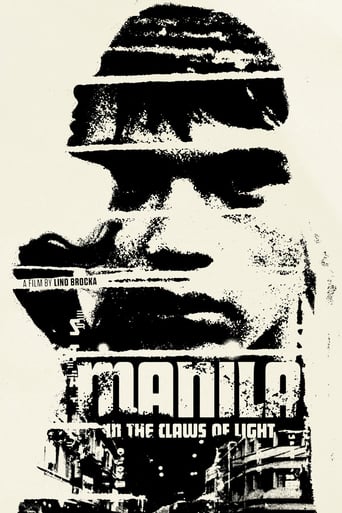
For years, cinema has tried to depict the terrible social injustice of poverty, with numerous films seeking to portray the humanity of the poor in our society. Many of these movies heroically try to bring into light empathy for the impoverished. In the 1970’s the Philippines was a third world, corrupt country run by a cruel dictatorship. In a country like that, not only does poverty run rampant, but its effects are more horrifying, as in these countries a person could easily die from starvation. With his movie, “Manila in the Claws of Light”, Lino Brocka tackles this topic seen through the eyes of the personal tragedy of one young man.
Julio Madiaga (Rafael Roco Jr in his film debut) is a young man living in a remote and quaint fishing village. He grew up with Ligaya (Hilda Koronel), who became the love of his life. One terrible day, an apparent social worker from Manila visits the village and convinces Ligaya’s mother that she should allow her daughter to be escorted to Manila where she will be given an education and a better life. When a year had gone by, it was already over 6 months since anyone heard from Ligaya. A worried Julio takes all his saved earnings to Manila in a desperate search for his lost love. Once in Manila, he is robbed of all his money and is forced to work at a construction site. The money he earns from the torturous work is barely enough for food. When the construction job ends, he lowers himself further, working as a male prostitute in the thriving sex trade of the Manila gay community. He eventually discovers that Ligaya was brought to Malina to be a prostitute herself, having ended up as an imprisoned and kept woman to a Chinese businessman who even fathers her a child. Julio vows to save her.
By basing his movie on an ill-fated romance in the vein of Romeo and Juliet, Brocka has developed a stirring story about the plight of the poor, easily expendable working class of Manila. The Marco-led Philippines of the 1970s exploited the desperate poor working class labor force that thrived during a form of capitalism that completely ignored social issues, making the lives of the working class not much different from slavery. If one did not make money, one died of starvation. In addition, the authorities worked on a bribery system that left countless people disenfranchised without protection. Julio’s construction team foreman keeps two thirds of the salary to himself and fires anyone who complains. The work itself is not only backbreaking, but also unsafe and dangerous. There is absolutely zero attention paid to safety, as in one unforgettable scene, an unusually positive co-worker of Julio falls to his death in a work accident. He was in the middle of singing a song to raise everyone’s morale when the accident took place. One of the many crushing blows on hope that will occur throughout the movie.
Brocka does not hold back in the desperate message of his story, as the movie gives a penetrating depiction of not only the abuse of low-class labor, but also the sex industry of Manila. Sleeping on the city boardwalk, Julio is picked up by a friendly man who takes him back to a nice apartment and serves him a good meal. While staying overnight with his newfound friend, Julio discovers what his new friend does for a living and is convinced to give it a try before realizing that the gay sex trade demands too much for even him.
What I found interesting in the movie was how selflessness would shine within the poor people shown. Julio always found someone who was willing to share some of the pittance that they had to help him survive. There was always a male friend who helped Julio. Whether at the construction site, the red-light district or in the final section of the movie, in Chinatown, where Julio finally finds Ligaya. This humanity is tied to compassion and love, as many people he comes across become moved by his story of lost love and atonement. He, in turn, is moved by the sad predicaments of his new friends, which quite often were even more tragic than his.
One of the striking aspects of the movie is its almost picturesque depictions of the lower side of Manila. There are the shanty town waterfront slums, the harsh, unforgiving construction site, the gay-district and a colorful Chinatown found in the more affluent areas of the city. All are given a very stylized view within the sad story. In addition, Julio tends to daydream about his former life in the fishing village and his idealized love for Ligaya. These memories will come to him when he is at his lowest and give him strength to continue. A strength that will eventually turn into deep anger. Brocka never holds anything back as he is telling a story that can’t possibly have a happy end. This is a serious film on a serious subject, and I found myself captivated by its different cruel world.
“Manila in the Claws of Light” is a brilliant piece of filmmaking that brings to light the unbearable consequences of heartless policies towards those who have no voice. It is a superb piece of cinema and one of the best portrayals of poverty coming from a country that is no stranger to human suffering.


